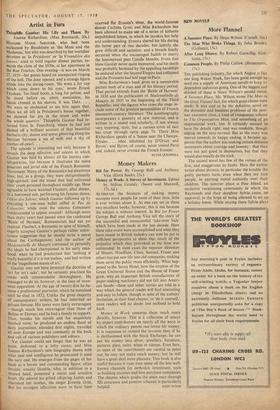Artist in Furs
Th6ophIle Gautier: His Life and Times. By Joanna Richardson. (Max Reinhardt, 30s.) MADAME MARIE SABATIER, who had been acclaimed by Baudelaire as 'the Muse and the Madonna,' but who was described by her worldlier devotees as 'la Presidetzte' or 'la Vivandiere des fount's,' used to hold regular dinner parties, to- wards the close of the 1850s, at her apartment in the Rue Frochot. One evening—it was on March 27, 1859—her guests heard an unexpected ringing of the bell. The door opened, and a strange figure strode into the dining-room. 'He wore a fur cap which came down to his eyes,' wrote Ernest Feydeau, 'fur-lined boots, a long fur pelisse, and he stood before us, silent, motionless, his hands crossed in his sleeves. It was Theo. . . . We were so enchanted to see him again that, when we all left la Presidente's house together, we shouted for joy in the street and woke the whole quartier.' Theophile Gautier had just
from St. Petersburg, where he had ust dashed off a brilliant account of that beautiful barbaric city, domes and spires glittering along the horizon 'between a sea of milk and a sky of mother-of-pearl. . .
The episode is interesting not only because it reveals the deep affection and esteem in which Gautier was held by almost all his literary con- temporaries, but because it illustrates the more generous and jovial side of the French Romantic Movement. Many of the Romantics led disastrous lives; but, as a group, they were extraordinarily high-spirited; and the mood that had enlivened their youth persisted throughout middle age. How agreeable to have watched Flaubert, after dinner, in a borrowed suit, performing his famous dance, !'Idiot des Salons; which Gautier followed up by executing a one-man ballet called le Pas du Cream ler; while even the solemn Goncourts condescended to appear amused! Although more than thirty years had passed since the celebrated `Battle of Hernani,' Romanticism had not yet expired. Flaubert, a Romantic in spite of himself, eagerly accepted Gautier's perhaps rather unfor- tunate suggestion that he should write a novel about the Carthaginians; and the author of Mademoiselle de Maupin continued to personify the ideals he had championed in his early man- hOod, when he had proclaimed that 'nothing is really beautiful if it is not useless,' and had written of the 'magnificent mania of art.'
Gautier may not have invented the doctrine of 'art for art's sake'; but he certainly practised his credo with commendable thoroughness. He managed to do so, however, in the face of stren- uous opposition. At the age of twenty-five he be- came a professional journalist, which he remained until he died in 1872. Unlike the great majority of contemporary writers, he had inherited no private fortune. His tastes were fairly extravagant —though much less extravagant than those of 13alzac or Dumas; and he had a family to support. Thus, besides his novels and his exquisitely finished verse, he produced an endless flood of daily journalism, attended first nights, travelled all over Europe and was constantly at the beck and call of various publishers and editors.
Yet Gautier could not forget that he was an artist, dedicated to a lofty cause; and Miss Joanna Richardson's new biography shows with what zeal and intelligence he prosecuted it until the very end. He emerges from the pages of her book as a heroic and commanding figure, often lovable, usually likeable, who, in addition to a shrewd head, possessed a warm and sensitive heart. He adored his gifted offspring Judith and cherished her mother, the singer grn est a Grisi. But his strongest affections seem to have been reserved for Ernesta's sister, the world-famous dancer Carlotta Grisi; and Miss Richardson has been allowed to make use of a series of hitherto unpublished letters, in which he invokes her help and understanding. Ernesta shared his life during the better part of two decades; but latterly she grew difficult and secretive; and a breach finally occurred when she encouraged Judith to marry the homosexual poet Catulle Mendes. From that blow Gautier never quite recovered; and his death was probably hastened by the appalling hardships he endured after the Second Empire had collapsed and the Prussians had laid siege to Paris.
Miss Richardson's book gives us a memorable picture both of a man and of his literary period. That period extends from the 'Battle of Hernani' in 1830 and the publication of Mademoiselle de Maupin in 1835 to the beginning of the Third Republic; and the figures who cross the stage in- clude some of the greatest personalities of French nineteenth-century literature. The autobiography incorporates a quantity of new material, and is written in a sound and scholarly, if not always very inspiring, style; but a curious error of fact has crept through upon page 79. There Miss Richardson speaks of a 'house near the Champs- Elysees . . . once inhabited by D'Orsay and Byron'; and Byron, of course, never visited Paris and, indeed, never crossed the French frontier.
PETER QUENNELL






























 Previous page
Previous page